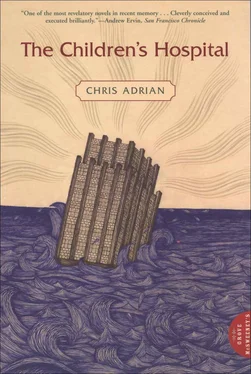“Graduation,” Vivian said. “And med-school interviews.”
“You said you weren’t going to wear pants at graduation.”
“I chickened out.”
“I didn’t,” Jemma said, recalling the curious feeling of the cheap rayon gown against her bare bottom.
“Sorry,” Vivian said.
“Well,” Jemma said, “what other lies did you tell me?”
“Nothing that ever mattered,” Vivian said sadly. “None of them were the worst thing.”
“I’m here for my checkup,” Jemma said, deliberately not asking what the worst thing was. Vivian lifted her face and gave Jemma a sad, sweeping look.
“You’re fine,” she said, then lowered her head again.
“Well, I don’t feel fine,” Jemma said. “My back hurts and my belly hurts.”
“That’s normal.”
“Well what about my clumsiness and my numb fingers and my nap attacks?”
“Normal, too.”
“The baby is rolling around all the time. I think it’s trying to get out already.”
“You’re fine.”
“Don’t you want to check a urine? Don’t you want to take my blood pressure? What if the lie is all weird? What if it’s breech?”
“It’s fine. You’re fine. Don’t you get it?” She looked up again, and seemed more familiar now — angry Vivian instead of sad, pensive Vivian. “Do you really think something bad could possibly happen to your baby?”
“Of course something bad could happen. What, you think I’m being a freak because I’m worried? Have you noticed the mystery disease that’s killing everybody?”
“Not the kids,” Vivian said. “They’ll be fine.”
“How the hell do you know that?”
“It sort of… came to me.” She looked down at her feet again and sighed. “You can’t sit here all fucking day and not figure something out. Are you here to move in with us? It’s going pretty well, you know. We could make it, maybe. Just maybe. If you helped it might all go quicker.”
“I’m here for a checkup. What happened to the days when I used to have to beat you with a stick to keep you from doing Leopolds on me?”
“You’re fine,” she said again. She made a blessing motion toward Jemma, without looking at her. “All is well.”
“Jesus Christ,” Jemma said, stomping up and sitting down. “How would you like it if I transferred my care to Dr. Killer?”
“She’ll be dead weeks before you have that baby,” Vivian said simply. “Aloysius would probably be better. At least he can work the sono.”
“He’s in the PICU.”
“Well, maybe not him, then. You don’t need anybody, anyway. Do the sono yourself, if you’re that curious to see how totally normal and fine your baby is. Or I could do it, I guess, though it’s totally not necessary, if I could leave here. But I can’t, so you’d have to stay.”
“No thanks,” Jemma said. “I’ve got other obligations.”
“Nothing important, though. You’ll see.”
“I’ll just go do it myself,” Jemma said. “I’ll do it all wrong. I’ll get ultrasound poisoning. I’ll make the baby deaf. What do you care?” Vivian didn’t reply. Jemma sat down. “How are things up here?” she asked, after another few minutes of silence.
“Well enough. Nobody up here is sick yet. We haven’t got an answer, but we’re listening. I’m listening.”
“What have you heard?”
“Not much. A little whisper, now and then. You shouldn’t have… why did you… how could you… what were you thinking when you… But I never hear the good part. I have my suspicions, though. You know how you can tell what a street sign says, even if you can’t read the letters in the name? Just from the shape and the context of the letters? It’s like that. I see the shape of it and I almost know what the word is, what the thing is, and then I’ll know.”
“Then what? What happens after you know, or think you know?”
“Then we fix it. Then we swear it off. All together — heave! I don’t know. Somehow that doesn’t seem like the hard part, maybe just because it’s not the part that’s right now. It will point to what’s next.”
“Rob is getting depressed. He used to love the PICU and now it just makes him sad.”
“I think I should be able to see it pointing, already. I mean it’s already pointing. I should be able to see it.”
“Snood’s a Friend. Not my friend, mind you. He never shuts up.”
“Why can’t I see it? It’s so stupid, to know what’s wrong but not know how to describe it, and to know we have to do something but not know what. Every time somebody dies it’s going to be my fault.”
“It’s going to be my fault,” Jemma said.
“It’s not your fault.”
“Well it sure isn’t yours.”
“Except it is,” Vivian said.
“You’re crazy,” Jemma said, and then a moment later added, “I miss you.” Vivian took her hand but didn’t look at her.
“I know,” she said.

It was the last show, and had the feeling of being a last show even before everybody knew that’s what it was. It was grander and fancier and stupider than anything they’d put on before (the stage they made for the talent show never went more than a few days without hosting a play or a dance recital or reading of deadly boring poetry) and the only show produced with the full energies of the Council, which seemed by this production to come into its own as a mature political entity, or prove anyway that it could be swift and efficient in organizing its populace in an appointed tasks. As swiftly as other governments had tried and executed dissidents, and as efficiently as others had invaded a neighbor, and as gorgeously as others had built monuments to death or war or courage, the Council whipped up a Broadway-caliber production of Hello, Dolly.
Dr. Sashay took the starring role, surprising everyone when she turned up for auditions and brought Frank, the director, to tears with her rendition of “Don’t Let the Parade Pass Me By.” Maybe it was just that Frank, like everybody else, was rather depressed anyway, and might have been brought to tears by a troupe of dancing poodles — but nobody who heard her voice ringing through the auditorium could deny that she was loud, or emotive, or that she could carry a tune. The other roles filled so quickly and easily that Frank suspected the hand of God was working to round up his cast. “It’s like you were born to play this role,” he said to Anika, and to Dr. Sasscock, and to Dr. Pudding, and each of them confided in the hastily written and printed notes to the show that they had indeed felt their hearts respond to the Council’s call for auditions, and had felt a vocation for their parts when they watched one of the film versions (either the original Streisand or one of the over two-dozen pornographic variations), a correspondence and a rightness, as Dr. Sashay put it, that she hadn’t felt since she first heard the word neuroblastoma, or saw the quivering, firm white mass of the tumor in gross section. Suddenly, she wrote in the program, I knew what I had to do.
It wasn’t a holiday — the situation on board the hospital was too worrisome to proclaim one — but everybody there was familiar with the concept of respite care, and the Council had learned from the grueling exhaustion of their first few months at sea that caregivers have their needs, too, and that to ignore them was to invite early and perhaps avoidable burnout. So they billed it as a night of hope and respectful celebration of how far they had made it, and how much they appreciated that they could dance and sing and lift their hearts even in the middle of this new ocean, and even with the shadow of death falling over their toes, if not their hearts (Dr. Snood’s words). It was exactly the sort of thing Vivian now abhorred, and she and the ninth-floor squatters were the only people, besides the PICU staff watching over the six victims of the botch, who were not in attendance, either in the square field of chairs in the lobby, or in the risers and chairs set up all along the ramp. Way up on the ninth floor a tiny face appeared at the balcony ledge, now and then, during the show, but never for more than a few minutes.
Читать дальше













